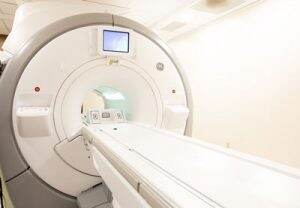Top 10 Challenges for MRI Safety Evaluation
 There are several safety concerns for patients with metallic implants who require MRI, including magnetic forces, torques, radiofrequency-induced heating, gradient induced heating and vibrations, unintended stimulation, and device malfunction. We help medical device manufacturers evaluate their devices for safety in the MRI environment and perform physical testing according to ASTM F2052, F2213, F2119 and F2182 [1-4]. After the physical testing is complete, we provide the necessary information for MRI safety labeling and supporting scientific rationale that is reported in the instructions for use (IFU) of the device according to ASTM F2503 and FDA guidance documents [5-8].
There are several safety concerns for patients with metallic implants who require MRI, including magnetic forces, torques, radiofrequency-induced heating, gradient induced heating and vibrations, unintended stimulation, and device malfunction. We help medical device manufacturers evaluate their devices for safety in the MRI environment and perform physical testing according to ASTM F2052, F2213, F2119 and F2182 [1-4]. After the physical testing is complete, we provide the necessary information for MRI safety labeling and supporting scientific rationale that is reported in the instructions for use (IFU) of the device according to ASTM F2503 and FDA guidance documents [5-8].
We have successfully evaluated numerous medical devices for MRI safety and have supported global regulatory submissions with testing and computational simulation data. During the accumulation of this experience, our team has identified the top ten challenges that are commonly faced when evaluating medical devices for MRI safety. To address many of the challenges, it is advantageous for medical device manufacturers to out-source MRI safety evaluations and have a dedicated external resource to stay current with changes in MRI technology, testing standards, and regulatory expectations. Moreover, consulting companies like MED are able to be more efficient and cost effective by amortizing the cost of expensive testing equipment, cost of validating the test method, and on-going expenses to maintain test method accreditation across numerous projects over many years.
One of the primary challenges in evaluating radiofrequency-induced heating is determining the worst-case device. We have successfully used validated simulation tools to identify the worst-case device size, configuration, material, orientation and MRI scanner for a wide range of medical devices. You can learn more about this process by reading our recent whitepaper or by watching a webinar we participated in by using this link. These resources discuss the challenges that medical device manufacturers face when evaluating medical devices for MRI safety. A case study is shared about using COMSOL Multiphysics® simulation software to predict the worst-case device size for RF-induced heating during MRI. Through this example, a brief introduction to the coupled electromagnetics and transient heat transfer and the associated experimental methods used for calibration of the model are provided. This webinar will be of interest to regulatory scientists, development engineers, and clinicians concerned with MRI safety for patients with medical devices.
To learn more about our services and how we can partner with you, please visit medinstitute.com, call us at 855.463.1633, or send us an email askmed@medinstitute.com.
References
[1] ASTM F2052, Standard test method for measurement of magnetically induced displacement force on medical devices in the magnetic resonance environment. ASTM International, 2013.
[2] ASTM F2213, Standard test method for measurement of magnetically induced torque on medical devices in the magnetic resonance environment. ASTM International, 2017.
[3] ASTM F2119, Standard test method for evaluation of MR image artifacts from passive implants. ASTM International, 2013.
[4] ASTM F2182, Standard test method for measurement of radio frequency induced heating on or near passive implants during magnetic resonance imaging. ASTM International, 2019.
[5] ASTM F2503, Standard practice for marking medical devices and other items for safety in the magnetic resonance environment. ASTM International, 2020.
[6] Guidance for Industry and FDA Staff: Establishing safety and compatibility of passive implants in the magnetic resonance (MR) environment, 2014.
[7] Guidance for Industry and FDA Staff: Assessment of radiofrequency-induced heating in the magnetic resonance (MR) environment for multi-configuration passive medical devices, 2016.
[8] Guidance for Industry and FDA Staff: Testing and Labeling Medical Devices for Safety in the Magnetic Resonance Environment, 2019.
Get email about news, services, and events from MED Institute.
OUR COMMITMENT
We are committed to consistently performing services with high quality, that deliver exceptional results, and add value to the client’s business.
For client surveys sent since 2024, we received ratings of 4.99/5 (16).

